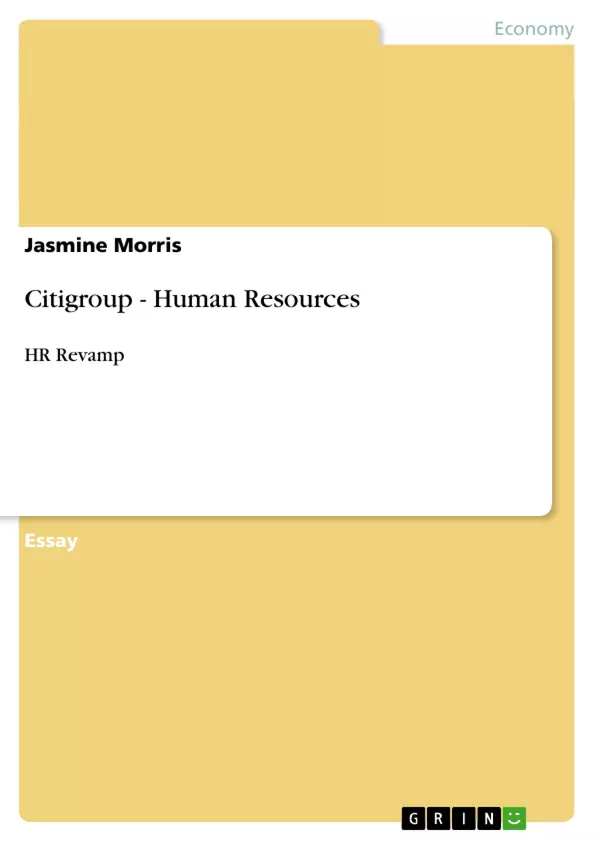Citigroup Inc. (or CITI) is an American multinational financial services corporation that is headquartered in Manhattan, New York City, New York in the United States. Citigroup was formed in 1998 from the biggest mergers in history with Citicorp, the largest banking group in America, and Travelers Group, an insurance company. The company provides the world with financial services expanding in 140 countries and employees about 260,000 staff worldwide holding over 200 million customer accounts. Despite their huge losses during the global financial crisis and unethical standards (which is discussed later), employees can learn from their firm by seeking problems ahead of time and applying resolved solutions to our own lives. Identifying and understanding practices of the firm and their decision making greatly affects our lives, bad or good. This is a time for Human Resource Managers to come into play.
Inhaltsverzeichnis (Table of Contents)
- Citigroup, Inc.
- Citigroup Revamps HR
- Citigroup's Downfall
- Addressing Issues in the Firm
Zielsetzung und Themenschwerpunkte (Objectives and Key Themes)
This text examines the transformation of Citigroup's Human Resources department under Michael Schlein, analyzing both its successes and failures. It explores the challenges faced by the company in navigating the global financial crisis and subsequent recovery, including unethical practices, leadership changes, and employee morale.
- The role of Human Resources in corporate transformation
- The impact of financial crises on employee morale and organizational stability
- Ethical considerations in corporate decision-making and their consequences
- The challenges of leadership in times of crisis and restructuring
- The importance of effective communication and employee feedback in managing corporate issues
Zusammenfassung der Kapitel (Chapter Summaries)
- Citigroup, Inc.: This section provides a brief overview of Citigroup, its history, and its position in the financial services industry. It highlights the company's global reach and its impact on the global economy.
- Citigroup Revamps HR: This section focuses on the changes implemented by Michael Schlein in Citigroup's Human Resources department. It describes the challenges faced by the department and the solutions implemented, such as the adoption of intranet-based systems and e-learning programs. The importance of employee feedback and a strong work-life balance is also emphasized.
- Citigroup's Downfall: This section explores the negative consequences of Citigroup's unethical practices and its struggles during the financial crisis. It examines the company's accounting scandals, compensation plan controversies, and the forced resignation of CEO Vikram Pandit. The section also discusses the company's subsequent job cuts and their impact on employees.
- Addressing Issues in the Firm: This final section highlights the need for open communication and effective management to address workplace issues and prevent future crises. It emphasizes the importance of proactive problem solving, fair management practices, and ensuring that employees feel heard and valued.
Schlüsselwörter (Keywords)
The text focuses on the key topics of Human Resources management, corporate transformation, financial crises, ethical behavior, leadership, and employee morale. It further explores key concepts such as intranet systems, e-learning programs, employee feedback, work-life balance, ethical scandals, corporate restructuring, job cuts, and open communication.
Frequently Asked Questions
How did Citigroup revamp its Human Resources department?
Under Michael Schlein, Citigroup adopted intranet-based systems for HR services, implemented e-learning programs, and focused more on employee feedback and work-life balance.
What caused the downfall and ethical scandals at Citigroup?
The company suffered from unethical standards, accounting scandals, and controversies over executive compensation plans, which were exacerbated by the 2008 financial crisis.
What was the impact of the financial crisis on Citigroup's employees?
The crisis led to massive financial losses, job cuts, and a significant decline in employee morale and organizational stability.
Why did CEO Vikram Pandit resign?
Vikram Pandit's resignation was largely forced due to the company's struggles during the recovery phase and disagreements over leadership and strategy.
What is the role of HR Managers in times of corporate crisis?
HR Managers are crucial for maintaining open communication, addressing employee concerns, managing restructuring fairly, and rebuilding trust within the firm.
- Citation du texte
- Jasmine Morris (Auteur), 2013, Citigroup - Human Resources, Munich, GRIN Verlag, https://www.grin.com/document/266779



